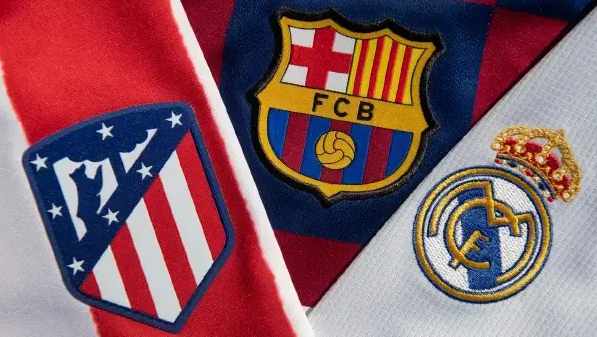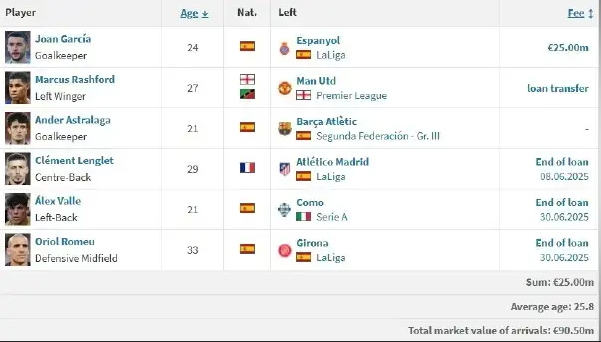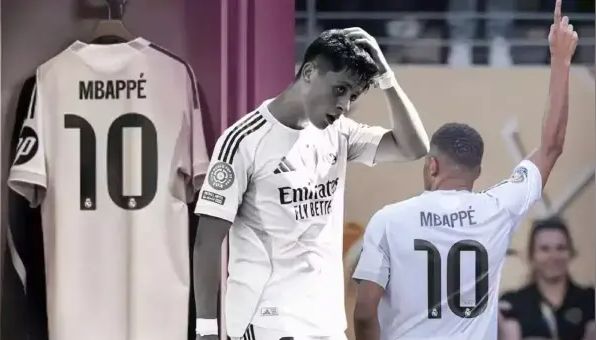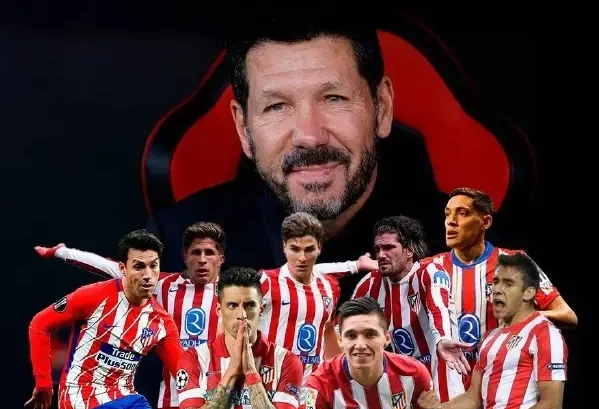
After winning the domestic treble last season, Barcelona spent just €25 million in the summer window to sign goalkeeper Joan García and loan Marcus Rashford—seemingly frugal, yet they built a "strong and deep squad" with small money (Transfermarkt values their new signings at over €90 million combined). In contrast, Real Madrid and Atlético Madrid each splashed €170 million on reinforcements, determined to overthrow Barça’s dominance. However, the Blaugrana, led by Yamal and Pedri, are still seen as more title-worthy than Mbappé’s "new Galácticos" and Simeone’s "Argentine-style Atlético".
1. Barça: €25M Buys €90M Worth of Quality, 3 Players per Position
Barça’s summer moves are a masterclass in "cost-effectiveness": they only spent €25 million on Joan García, last season’s La Liga "save king", and loaned Rashford to instantly upgrade their forward bench (leaving behind the era of Victor and Fati). More crucially, Gavi returned from injury, Andreas Christensen’s recovery strengthened the defense (offsetting Inigo Martínez’s departure), and with promotions from La Masia, Barça will have at least 3 players available for every position next season.
While player sales have been slow (Peña and Fermín haven’t left yet), letting go of fringe players like Victor has already brought in €26.4 million, making the summer window profitable. The only concern is that finances remain tight, requiring more transfer revenue for support.
New signings will also bring tactical upgrades: García, with his quick groundwork and ability to expand his defensive range using his legs, perfectly fits Hansi Flick’s aggressive style (impressive one-on-one save efficiency in pre-season), only needing to improve his rushing errors; though Rashford is affected by a back injury, his dribbling skills and counter-attacking pace align with Barça’s fast transition play; Baldé, signed for €2 million, has dribbling rhythm similar to Yamal and can serve as his backup.

2. Real Madrid: 6-Year Highest €180M Spend, Still Has Fatal Flaws
Last season was a "humiliating campaign" for Real Madrid: they were crushed by Barça in La Liga, Copa del Rey, and Supercopa de España (conceding 16 goals in 4 games), eliminated by Arsenal in the Champions League quarter-finals (1-5 on aggregate), and thrashed 4-0 by Paris Saint-Germain in the Club World Cup. To turn things around, they spent nearly €180 million (including €10 million in compensation for Xabi Alonso), the highest summer investment in 6 years.
But problems persist: weak build-up play from the back, panicking under high pressing (exposed multiple times last season against Barça and Arsenal); new center-back Witsel is good at building up but struggles with pressing due to his height; the attack is even more awkward—Mbappé dislikes aerial duels, and Jude Bellingham (suspended at the start of the season) is the only reliable target for long balls, forcing the midfield and defense to take on more progression tasks. The only bright spot is young talent Gonzalo García, who impressed in the Club World Cup and his clinical finishing is a much-needed boost for Real.

3. Atlético Madrid: €170M for "Argentine Attack", Champions League Rookies Rely on Simeone
Atlético spent €170 million this summer and also signed Argentine international Nicolás González from Juventus, with total investment expected to exceed €200 million—aiming to build an "Argentine attack" (Almada, González + Álvarez, Giuliano Simeone) to break the "La Liga duopoly".
But risks abound: high-priced signings like Baena and Almada have no Champions League experience, and most are players aged 22-27 in their prime—flexible but unpredictable. More importantly, Diego Simeone has a poor track record of developing young players, so activating these "Champions League rookies" will be a challenge. Additionally, the coexistence of Griezmann and Álvarez, and whether 27-year-old new signing Hanzko can replicate a "Van Dijk-style comeback", are key variables for Atlético’s title challenge.

Conclusion: Spending ≠ Winning, Long Season Holds Uncertainties
Real Madrid and Atlético’s combined summer spending may exceed €400 million, but their current strength may not match Barça’s, who spent just €25 million. However, the long league season means injuries and form fluctuations could rewrite the outcome—Barça also lost to relegation teams last season, leaving Real and Atlético with a chance to stage an upset.




